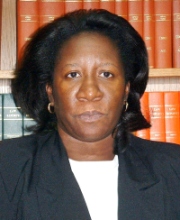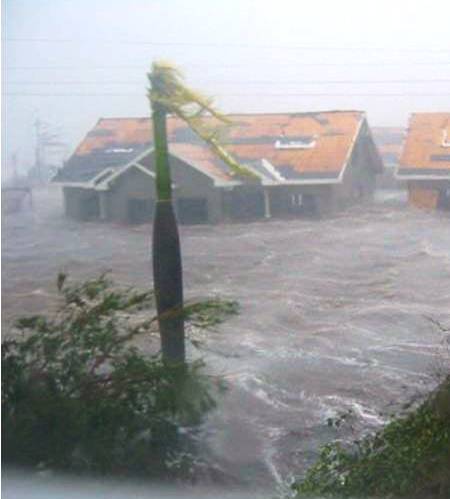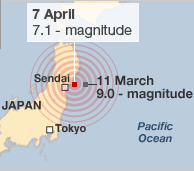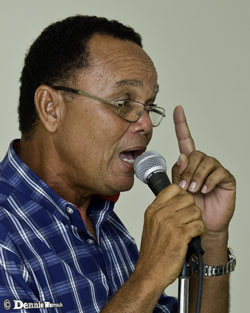Archive for April 7th, 2011

Solicitor general becomes new public prosecutor
 (CNS): The solicitor general, Cheryll Richards QC, has been appointed the Cayman Islands’ first ever Director of Public Prosecutions by the Judicial and Legal Services Commission (JLSC). Richards takes up the post on 1 May, which will herald in the separation of criminal prosecution from the civil side of the existing legal department. In the new constitution, the director of public prosecutions will be the responsible for instituting, continuing or discontinuing public prosecutions on behalf of government. The DPP will be independent and not be under the control of any other authority and Richards will be a chief officer in her own right.
(CNS): The solicitor general, Cheryll Richards QC, has been appointed the Cayman Islands’ first ever Director of Public Prosecutions by the Judicial and Legal Services Commission (JLSC). Richards takes up the post on 1 May, which will herald in the separation of criminal prosecution from the civil side of the existing legal department. In the new constitution, the director of public prosecutions will be the responsible for instituting, continuing or discontinuing public prosecutions on behalf of government. The DPP will be independent and not be under the control of any other authority and Richards will be a chief officer in her own right.
The Office of the Director of Public Prosecutions and the Portfolio of Legal Affairs will be split between criminal and civil matters by 1 November this year and the two departments will be in separate accommodation. The role of the attorney general and the solicitor general will change as a result of this appointment. However, the attorney general will continue to speak on all legal affairs in Cabinet and the Legislative Assembly.
Richards was appointed after an open recruitment process after the post was advertised locally and overseas. Following an initial short-listing process, the deputy governor chaired an interview panel, which comprised three members of the JLSC and the acting chief officer for the Portfolio of the Civil Service.
According to a release from the Governor’s Office, four people were interviewed, two of whom were local candidates. Following the interviews, the recruitment panel was unanimous in its view that Richards was clearly the strongest candidate.
Richards has twenty-five years experience as a prosecutor, appearing before all tiers of courts. She joined the staff of the Cayman Islands Attorney General’s Chambers as a prosecutor in 1996.
In 2005 she was appointed as the solicitor general and was the chief officer at legal services, which included the law school, criminal and civil division and legal drafting. Richards was appointed Queens Counsel in November 2009.

Gov’t to sell insurance shares
 (CNS): Government is currently looking at divesting the 24% share it holds in an insurance company it acquired in part payment of its Hurricane Ivan settlement in 2005. Premier McKeeva Bush told the Legislative Assembly on Thursday morning that his administration was looking into the possibility of selling the shares, which were originally in Cayman General Insurance. As a result of a number of sales and acquisitions over the past six years the shares held by government are now in Cayman First. The shares were given to government in lieu of the $20 million balance of its estimated $70 milllion claim after the 2004 hurricane. Bush said that government would like to get as much as possible for the shares but it would not be able to get back the full amount.
(CNS): Government is currently looking at divesting the 24% share it holds in an insurance company it acquired in part payment of its Hurricane Ivan settlement in 2005. Premier McKeeva Bush told the Legislative Assembly on Thursday morning that his administration was looking into the possibility of selling the shares, which were originally in Cayman General Insurance. As a result of a number of sales and acquisitions over the past six years the shares held by government are now in Cayman First. The shares were given to government in lieu of the $20 million balance of its estimated $70 milllion claim after the 2004 hurricane. Bush said that government would like to get as much as possible for the shares but it would not be able to get back the full amount.
The revelation was part of the a government minute written in response to the Public Accounts Committee 2010 report on the auditor general’s findings, originally published back in 2007, on the government’s settlement with Cayman General.
The minute outlined government’s reasons for accepting the shares as part of the settlement, which stated that if the government not made the decision to accept the deal hundreds of Caymanians could have suffered.
“The committee ought to understand that had the government not assisted the company the disastrous result would have been that hundreds of Caymanians would have become bankrupt without homes and loss of investments. The then government saved the day,” Bush said, referring to the previous UDP administration, which he had led. “Currently the government is actively considering the possible divestment of the shares,” he added.
In the original report by the then auditor general, Dan Duguay, it was revealed that government had paid somewhere between $80 and $240 per share. He estimated that the shares in 2001 were worth around $3 milllion and said government had not received value for money.
Speaking to the assembly on Thursday, Bush said that he had been criticized for making the decision and people had tried to say there was something crooked but the settlement was made to help the whole country because if the company had failed, not only would Caymanians not have had their claims met but Cayman National bank would also have been at risk.
He said he was not insured by Cayman General at the time but by “the other one which went down” (Dyoll) so he didn’t get anything from the deal. The premier said that at the time the government of the day had to look at the biggest one of the insurers if it was going to help and Cayman General was the firm which had the most local customers.
The shares which government wishes to sell are now in Cayman First, the insurance firm which only last month was ordered by the courts to pay $7 million to a local construction company for a disputed claim originally with Cayman General regarding Windsor Village.
The government response to the PAC report on the AG’s findings also acknowledged the need to diversify government’s future insurance coverage and the premier said that currently the government has multiple insurers, all of which have AM Best ratings of A- or higher, and it would continue to diversify the cover of government property.
Bush also told the Legislative Assembly that in light of recommendations in the reports, the Lands and Survey Department was undertaking the assessment of government’s property assets to ensure that the current insurance cover the CIG holds is adequate. He said it was government’s intention to do this every three years.
The Public Management and Finance Law requires that government regularly assess the value of its assets, though no valuation has been conducted since the PMFL was passed in 2003. In his report Duguay had warned that without a valuation government was running the risk of being significantly under insured.
See original audit report below.

Japan: Earthquake prompts Fukushima evacuation
 (BBC): Authorities in north-east Japan ordered a general evacuation and workers at the damaged Fukushima Daiichi nuclear plant took shelter after an earthquake triggered a new tsunami warning. However, the tsunami warning was lifted after 90 minutes and the earthquake, with a magnitude of 7.1, did little obvious damage. Fukushima officials said the quake had no detectable effect at the plant. Last month’s 9.0 earthquake set off a tsunami which devastated the region. The earthquake, at a depth of 32 miles, struck off Japan’s north-east coast, close to the epicentre of the 11 March quake.
(BBC): Authorities in north-east Japan ordered a general evacuation and workers at the damaged Fukushima Daiichi nuclear plant took shelter after an earthquake triggered a new tsunami warning. However, the tsunami warning was lifted after 90 minutes and the earthquake, with a magnitude of 7.1, did little obvious damage. Fukushima officials said the quake had no detectable effect at the plant. Last month’s 9.0 earthquake set off a tsunami which devastated the region. The earthquake, at a depth of 32 miles, struck off Japan’s north-east coast, close to the epicentre of the 11 March quake.

Survey says Ucits Fund Assets tripled to $90b
 (Bloomberg): Ucits funds tripled assets to $90.5 billion last year as managers attracted clients seeking to put money into the more regulated and easier-to-trade alternatives to hedge funds. Firms started 129 funds last year that comply with the European directive known by the acronym for Undertakings for Collective Investment in Transferable Securities, Hedge Fund Intelligence said in a statement today. The funds raised more than $9.5 billion, according to the London-based data provider. Ucits allow clients to withdraw money in as little as a day, place restrictions on leverage and offer investors transparency of holdings that is similar to that of mutual funds.
(Bloomberg): Ucits funds tripled assets to $90.5 billion last year as managers attracted clients seeking to put money into the more regulated and easier-to-trade alternatives to hedge funds. Firms started 129 funds last year that comply with the European directive known by the acronym for Undertakings for Collective Investment in Transferable Securities, Hedge Fund Intelligence said in a statement today. The funds raised more than $9.5 billion, according to the London-based data provider. Ucits allow clients to withdraw money in as little as a day, place restrictions on leverage and offer investors transparency of holdings that is similar to that of mutual funds.
John Paulson’s Paulson & Co., based in New York and David Harding’s Winton Capital Management Ltd. in London are among hedge funds that started Ucits last year.
“The main driver is regulation,” said Joy Dunbar, editor of Absolute UCITS, a Hedge Fund Intelligence publication. “There’s an expectation that Ucits are safer than hedge funds because there is a certain amount of transparency and liquidity.”

Save Cayman presses on
 (CNS): With close to 1,000 signatures on the petition against the dredging of the North Sound, Captain Bryan Ebanks says he is not giving up the campaign any time soon and is also lending his support to the campaign in East End to stop the commercial sea port. The man spearheading the initiative to stop the proposed dredging for a channel to facilitate mega yachts said that all scientific reports over the years had pointed to a serious risk of losing the Sandbar if the reef protecting the sound was breached. Speaking to the people of Bodden Town on Tuesday evening at a meeting hosted by MLA Anthony Eden, the captain said the issue was not confined to West Bay boat captains as he asked for their support. (Photo Dennie WarrenJr)
(CNS): With close to 1,000 signatures on the petition against the dredging of the North Sound, Captain Bryan Ebanks says he is not giving up the campaign any time soon and is also lending his support to the campaign in East End to stop the commercial sea port. The man spearheading the initiative to stop the proposed dredging for a channel to facilitate mega yachts said that all scientific reports over the years had pointed to a serious risk of losing the Sandbar if the reef protecting the sound was breached. Speaking to the people of Bodden Town on Tuesday evening at a meeting hosted by MLA Anthony Eden, the captain said the issue was not confined to West Bay boat captains as he asked for their support. (Photo Dennie WarrenJr)
He said that there already was an economy in the North Sound which fed into Grand Cayman’s wider economy, feeding the tourism product, giving work to drivers, money to gas stations and more. Above all, Ebanks said, the goal was to protect Stingray City as he told the Bodden Towners the awe with which visitors held the Sandbar. Guests, he said, constantly told him how lucky Caymanians are to have such a place and always asked what the country was doing to protect and preserve it.
“If you took that out of the tourism equation I have no idea what could happen but we know many people would be out of work,” he said. “If we breach that reef we may lose our national treasure. Would you want to gamble with that when it’s so precious?”
Despite claims by the premier that making the North Sound deeper with dredging would improve the quality of the water, Ebanks pointed to the scientific research that says otherwise, indicating the damage previous dredging has done.
The sea captain also wondered why the islands’ leader would want to impose the channel idea on the people when so many have made it clear they don’t want it. “Caymanians need to stop this. It’s time we wake up. If you leave it to just a few opposition politicians, it’s not going to stop because somebody is benefiting and it’s not us,” he warned.
Pledging his support to the campaign to stop the East End port, he asked the people of Bodden Town to also sign the petition to stop the dredging in the North Sound and for the districts to join forces against those proposed projects that would undermine the natural resources of the islands.
Ebanks recently did battle on TV with Premier McKeeva Bush, who was a guest on Cayman27’s Let’s Talk to the Experts. When the boat captain called in to ask the leader some questions about the dredging proposals, the premier accused Ebanks of approaching the government with a dredging proposal for the North Sound back in 2000, which Ebanks has categorically denied.
He told CNS that he has never been involved in a dredging exercise of any kind or any business related to construction or anything of that nature. “I have always made my living from the sea and from the restaurant business,” the captain said.
Ebanks said the fact that the premier had blatantly made up the story in order to try and discredit him simply because he did not agree with his point of view was unbelievable. Ebankssaid he understood now why he had encountered so much fear in the community about the premier frompeople who said they wanted to sign the petition but were genuinely afraid to do so.

Caribbean faces 60% chance of major 2011 hurricane
 (CNS): In the second forecasts for the Atlantic Hurricane Season 2011 the Colorado State University team is predicting 16 named storms instead of 17 as they had in December. The experts say the season, which is still two months away, will be above average with nine of the storms turning into hurricanes and five becoming major category 3-4-5 hurricanes with sustained winds of 111mph or greater. “We expect that anomalously warm tropical Atlantic sea surface temperatures combined with neutral tropical Pacific sea surface temperatures will contribute to an active season,” said Phil Klotzbach of the CSU Tropical Meteorology Project. The team predicts a 61% chance of a major hurricane tracking into the Caribbean, compared to the long-term average of 42%.
(CNS): In the second forecasts for the Atlantic Hurricane Season 2011 the Colorado State University team is predicting 16 named storms instead of 17 as they had in December. The experts say the season, which is still two months away, will be above average with nine of the storms turning into hurricanes and five becoming major category 3-4-5 hurricanes with sustained winds of 111mph or greater. “We expect that anomalously warm tropical Atlantic sea surface temperatures combined with neutral tropical Pacific sea surface temperatures will contribute to an active season,” said Phil Klotzbach of the CSU Tropical Meteorology Project. The team predicts a 61% chance of a major hurricane tracking into the Caribbean, compared to the long-term average of 42%.
“We have reduced our forecast slightly from early December due to a combination of recent ocean warming in the eastern and central tropical Pacific and recent cooling in the tropical Atlantic. It is recommended that all vulnerable coastal residents make the same hurricane preparations every year, regardless of how active or inactive the seasonal forecast is,” Klotzbach added. “It takes only one landfall event near you to make this an active season.”
The hurricane forecast team made this early April forecast based on a new forecast scheme that relies on 29 years of historical data. The hurricane team’s forecasts are based on the premise that global oceanic and atmospheric conditions, such as El Nino, sea surface temperatures and sea level pressures, that preceded active or inactive hurricane seasons in the past provide meaningful information about similar conditions that will likely occur in the current year.
The team’s annual predictions are intended to provide a best estimate of activity to be experienced during the upcoming season, not an exact measure.
“We remain — since 1995 — in a favourable multi-decadal period for enhanced Atlantic Basin hurricane activity, which is expected to continue for the next 10-15 years or so,” said Gray. “Except for the very destructive hurricane seasons of 2004-2005, United States coastal residents have experienced no other major landfalling hurricanes since 1999. This recent 9 of 11-year period without any major landfall events should not be expected to continue.”
Since 1949, the team said, five seasons have had oceanic and atmospheric conditions in February through March that were similar to those seen the past two months: 1955, 1996, 1999, 2006 and 2008. All but 2006 were active hurricane seasons.
The team predicts that tropical cyclone activity in 2011 will be approximately 175 percent of the average season. By comparison, 2010 witnessed tropical cyclone activity that was 196 percent of the average season.
PAC drove progress, says AG
(CNS): The auditor general says he has real concerns about the lack of leadership on the Public Accounts Committee (PAC). Alastair Swarbrick said that the public scrutiny which the committee gave to the situation on government accounts had acted as a driving force and without the public eye on those responsible he feared that a bad situation could get worse. Cayman’s public auditor said he believed that the public PAC meetings had been one of the main reasons behind what progress had been made in addressing the government’s financial reporting problem and without it things could slide again. He also confirmed that his own office could be left short of funds if a chair is not appointed and a meeting called by May.
The PAC is responsible for signing off the payments for the work of the auditor general and his office, and although he said the department had enough resources to cover the office’s needs for April, he was concerned about May and June. If no chair has been appointed, he would haveto make enquiries about how else money could be released to his office.
However, he was more concerned about how the lack of scrutiny regarding his latest report on the progress of government financial reporting would affect those responsible for getting the financials up to date, he said.
“I believe we saw some traction with progress on the backlog of accounts because of the strong leadership from the PAC and the public exposure it offers,” Swarbrick said on Tuesday at a press conference releasing his latest report on the current state of government financial accountability. “The issues were discussed openly and if that is no longer there I am concerned that those responsible won’t be proactive about the need to address this issue because no one will be holding them to account in a public arena.”
Despite some progress on government financial reporting, Swarbrick said it was not as much as he had hoped, and even in the light of the enormous efforts being made, there was still a problem of leadership when it came to dealing with the outstanding accounts. The loss of the PAC chair, he said, would likely add to that problem.
The AG said he would also be releasing reports of two special performance audits, which he expected would be ready before the end of the financial year. The audits are related to the management of overseas medical payments and the procurement process. He said that while he would be able to make them public shortly after circulating them to members of the Legislative Assembly, the lack of a PAC would mean that those reports would not be subjected to the usual public examination by lawmakers.
Independent MLA Ezzard Miller resigned from the post of chair of the committee, which also included opposition member Moses Kirkconnell and three government members, Cline Glidden, Ellio Solomon and Dwayne Seymour, because of the failure of the government representatives to turn up.
According to the rules governing legislative committees, at least three members would have to be present before the chair could hold a meeting. Miller said that as the members persistently failed to attend his only conclusion was that they did not have faith in him as a chair and he had no other choice but to resign in order to throw light on the problem.